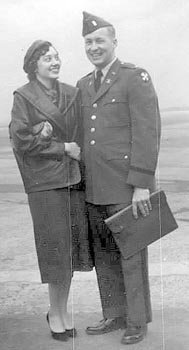‘Yes, at time of death’

CAPT. RONALD TAYLOR and CORINNE (THURMAN) TAYLOR
Both men had recently completed flight training and were part of the more than 70,000 troops who participated in a never before tried military training maneuver called “Operation Swift Strike III.” Newspaper accounts at the time referred to Operation Swift Strike as “the largest peacetime war games in the history of the nation.”
It was also notable for being the first time in U.S military history simulated nuclear weapons was used as part of a training exercise.
The operation was scheduled to last from July 21 to Aug. 16, 1963, and was intended to provide “realistic peacetime training” for combat ready military forces in joint operational tactics and techniques in preparation for war.
Thousands of troops took part in the military exercise at the Army base in Greenwood, S.C.
By the time Aug. 11 approached, the exercise was nearly complete.
Five more days and the exercise would have been over for Capt. Taylor and Second Lt. Taliaferro.
Both were nearing completion of their training and were eagerly awaiting the first chance they would have to visit their families and friends before they would be sent on a tour of active duty to war torn Vietnam to encounter even more harrowing experiences.
On the morning of Aug. 11, the furthest thing from the two soldiers’ minds was something going wrong on their training flight. Closer to their minds was what they would face in hostile territory in the foreign country they were about to be sent to for combat, not what could go wrong in a training exercise.
But something did go wrong.
According to newspaper reports from the time, it was Taylor who took the driver’s seat of a small L-19 observation plane and Taliaferro who rode in the passenger’s seat on what would prove to be an ill-fated trip.
The time was 11 p.m., and all was dark as the participants were regrouping to complete another phase of the maneuver when troops on the ground in a field a few miles away from the Greenwood Chemstrand Plant saw the plane Taylor was flying suddenly take a nosedive “almost straight down and burst into flames.”
The two soldiers lost their lives in the crash.
Lt. Taliaferro, 23, was from Osceola, Ark., a graduate of the University of Arkansas, and a member of Headquarters Co. 6th Howitzer Battalion, 16th Artillery.
Capt. Taylor, 26, was born and raised in Clinton, and served in the Headquarters Battery, the 6th Headquarters 3rd Artillery Howitzer B regiment.
Taylor’s body was “burned beyond all recognition,” and his death was ruled an accident, according to his death certificate.
Their deaths made a total of 11 fatalities during the Swift Strike mock war games, The Index Journal, a Greenwood, S.C., newspaper reported after their names were identified days later.
The two young men left behind friends and family members who have undoubtedly mourned their passing with each passing year since their deaths.
Taylor left behind a wife, two young daughters, his parents, and a brother at the time of his death.
His mother, Ethel Taylor, 99, of Clinton, recently celebrated her 99th birthday. In a recent interview with Ethel, she talked about her eldest son, Ronald, and how his untimely passing is something that, as a parent, she will never fully “get over.”
“My eldest, Ronald, was always a good boy. Both of my boys were good children. I’ll never get over his [Ronald’s] death. It’s something that, as a parent, you never want to experience,” stated Ethel.
“He had a bright future ahead of him. Loved to read, was studious, and never was much of a talker. But when he did have something to say it was something worth saying,” Ethel recalled.
Ethel said one of her fondest memories of Ronald was of him walking into the kitchen of their home in Clinton—the place in the house where Ronald and his younger brother Robert often found their mama—hugging her, and giving her a kiss on the cheek.
“It’s one of the things I miss the most,” said Ethel, as she paused for a moment to look at Ronald in his service uniform in a framed photo that hangs by her bedside.
“I literally have zero memories of him,” said Ronald’s youngest daughter Tana. At the time of her father’s death, Tana was a little more than a year old.
According to Tana, her mother—Ronald’s widow—never received any of his military life insurance benefits on a technicality stating he had not completed all of his training.
Taylor’s family was denied insurance coverage because he did not die in a combat zone, in hostile territory.
Capt. Ronald Taylor and Lt. Ben Taliaferro were on duty, serving their country, the day they died, the victims of a military aviation accident.
A question marked on Taylor’s death certificate was if the deceased was ever in the U.S. Armed Forces. The doctor’s reply was “yes, at death.”
Are the deaths of military service members like Taylor and Taliaferro—who swore an oath to defend their country and died honoring their oath at the time of death—any less honorable and significant?
Not all military deaths have been treated equally, though they should be treated with equal respect, no matter the cause of death.
It matters not how their lives were taken, whether they died in service, after service, are still living, what branch of service they fought in, whether their service was during war or peace time, but that they gave their lives to defend and protect their country.
A grateful nation honors Capt. Ronald Taylor and Lt. Ben Taliaferro for their service, as it does all Veterans—living and dead.
